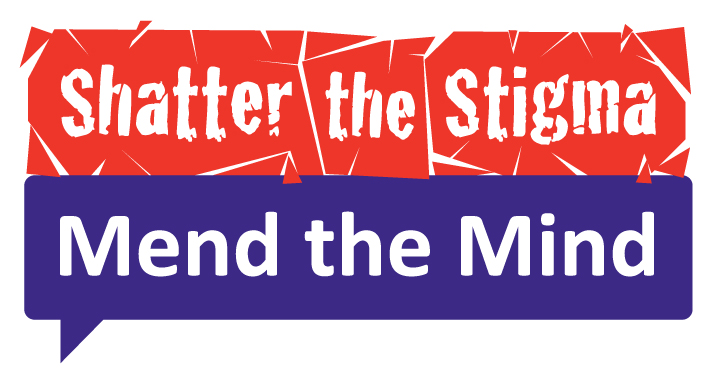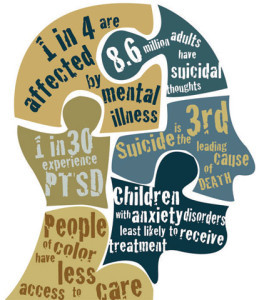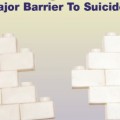
Six months prior to losing my dad to suicide, I graduated with my Master’s in Clinical Psychology. I entered the field working in community mental health where I received my first dose of reality when it comes to the stigma of mental illness. Working alongside individuals with chronic illnesses such as Schizophrenia, Bipolar Disorder One (yes, there are different kinds), and Major Depressive Disorder showed me firsthand how our society treats those who have been given these diagnoses. It is terrible, it is awful, and it is just downright wrong. A new flame was ignited inside me, as I wanted to help educate the world on what mental illness is. Then, six months later, I lost my dad to suicide. He was not diagnosed with one of the above illnesses, yet clearly he was suffering from an illness that caused him significant mental pain. It was then that I learned that there is a whole other layer to mental illness.
 The layer I am referring to is the stigma that accompanies everyday depression and anxiety. One commonality that I have found among many of the survivors that I work with is that their loved one appeared to have a great life. Whether it was the job they held, the beautiful children that filled their home, the loving partner that slept next to them, or the friends that stood around them, life appeared to be good. Heck, in some cases it appeared to be pretty close to perfect. Their friends and families all ask the same question, “How could this person take their life?”
The layer I am referring to is the stigma that accompanies everyday depression and anxiety. One commonality that I have found among many of the survivors that I work with is that their loved one appeared to have a great life. Whether it was the job they held, the beautiful children that filled their home, the loving partner that slept next to them, or the friends that stood around them, life appeared to be good. Heck, in some cases it appeared to be pretty close to perfect. Their friends and families all ask the same question, “How could this person take their life?”
There is a difference between normal depression and anxiety that comes with life circumstances that may or may not be in our control. In time though that normal depression and anxiety can turn into a more clinical form. When it does the message is often the same, “It could be worse” or “This too shall pass.” So, what happens when it doesn’t? If this were happening to me, I am not sure I would continue to reach out. I would be seeking assistance and validation, and instead receiving the message that what I am feeling is not ok.  This to me is the power of another type of mental illness. The less severe, less chronic, and less rehabilitating, yet it often leads to another life ending. Why are we so afraid to acknowledge this type of mental illness?
This to me is the power of another type of mental illness. The less severe, less chronic, and less rehabilitating, yet it often leads to another life ending. Why are we so afraid to acknowledge this type of mental illness?
My intention with this post is not to place blame on anyone. It is to bring awareness to depression and anxiety. To let people know that there are full functioning moms, dads, friends, parents, etc., who are suffering in silence. They go to work everyday, achieve great things, play with their kids, go out with friends, and yet are suffering the entire time. We need to let them know that it’s ok to talk about. We need to let them know that it isn’t them, it’s their brain. We need to validate their feelings and help them find a solution. Mental illness does not discriminate and it certainly comes in many different forms.




My son suffered from Epilepsy. My husband is a wounded soldier with TBI/PTSD, chronic pain and a rat tail of other problems, which come with brain injuries and spinal chord injuries. I know a thing or two about the Stigma. Our family been struggling with this for almost a decade. We are singled out, left out, misunderstood on almost every level and have even been accused of “milking the system” and “not doing enough to get better”. Nobody really understands or even tries to understand how we live our life now. It’ s not the norm. If your life isn’t the norm, you will be judged. Our son took his life, he could no longer bear the pain caused by the stigma. My husband keeps to himself and I get isolated with it. Our society reacts very inappropriately towards people with these invisible disorders.
I am so sorry for your suffering, your husbands illness and the lost of your son due to all this pain and no help. How are we suppose to heal and get the help needed when there really isn’t any good doctors and such a strong stigma towards the mentally ill. My son was told over and over again by his friends that there is nothing wrong with him and he just needs to get over it. So many people only look at the surface and do not take the time to really see the pain and when they do they don’t want to take the time to help. Sorry if a rambled a bit but all these post have the same underlying message, we need to be more accepting and there needs to be better help for those in need.
You just described my son who was 24 when he took his own life on 10/10/16. He left behind a 2 year old son who will not remember his daddy when he grows up. He had a job he loved and was going to school to be an electrician. No one had a clue he was unhappy and depressed. I was in total shock when I found out what he had done. Not a day goes by that I don’t cry and wonder why he did it. My sister died by suicide in 1984. She however was clinically depressed and bipolar.
Jessica Unfortuately I can relate all too well to your experience in the mental health field. My son had been treated since the third grade at what is considered the top hospital in the U.S. for mental health issues. He was diagnosed with ADHD and Epilepsy. By the time he was in his 20’s I could see his disease had morphed into a far more ominous condition. Due to HIPPA laws I no longer had any input as to his diagnosis without his permission. He finally gave me permission to speak with the doctor whom had treated him since he was a child. My son was in the room with us. After speaking with his doctor he told me he thought he was psychotic. I was shocked when he told me he would not change his diagnosis due to the stigma attached to mental illness. The end result my son died by suicide due to this doctor not treating him for the disease he had. If he had any other disease in another part of his body and not his brain I would not be going through this daily hell I find myself in.
I just lost my 21 year old son to suicide and he suffered for years with depression and anxiety. Trying to find him good help was next to impossible. On the day he took his life i didn’t see the signs and it is killing me inside. He had everything going for him, but could only see the darkness and no longer the light. He woke up in physical pain everyday and it took everything out of him to get up and get going. The last time i talked to him he said he was willing to try another counselor and we were going to look into when I got home from an interview. Only when i got home I found him hanging in my garage. I am so lost and I just don’t know what to do about it. My heart is so broken and I miss my son Zak so much. There has to be a way to get good help for suffers of mental health.
Kimberly I want to offer my heartfelt condolences to you and your family. I lost my son at the age of 35. I found his journal amongst his belongings and read he had been planning suicide since the age of 17. My point is that no matter how close we are to our children we can never understand what is going on in their minds. After my experience with the mental health system it needs serious overhaul. We, the survivors, are suffering the ultimate price for the indifference shown to our family members suffering from diseases of the brain. Diseases they are for sure. If it was any other disease there would be money for research and proper diagnosis. My heart goes out to you, from one heartbroken mother to another. As for getting help for others a good place to start is with NAMI. This organization fights to get laws changed to get the best treatment and resources for those suffering from mental illness. May God bless you as you continue upon this journey no parent should ever have to travel. Hugs to you.
Is there any other way to get my son help other than getting an emergency petition and having the Police take him? He is 19 years old, will not take meds or go to the doctor and threatens suicide. His father committed suicide when he was 8 years old. It’s always so dramatic when the Police get involved and quite honestly the last time they took him the officer put him down on the ground. I understand why they need to be on guard but as a mother it’s very difficult to see.
I wish there was an easy answer to this. Unfortunately, since he is an adult you cannot force him to take medication. It does have to be court ordered. This is one of the trickiest aspects of mental illness. Is he diagnosed with Bipolar 1? The disease makes you think that you don’t need medications, and the medications often make you feel numb. Has he ever been involved in any mental health programs?
We know more about the solar system then we do about the human brain and yet G.P’s with minimal training to none prescribe antidepressants. There is no way possible a general practitioner can be an expert in these medications along with the demand from patients. I read that most adults visit a GP in the months prior to suicide and yet it is not prevented. Until the medical community reinforces doctors of their obligations to mental health and that they are responsible for this nothing will ever be done. I tell everyone I meet how my husband died because I want this to be a conversation that is accepted just like any other disease. O’bama Care in many instances requires the member to full fill their deductible before mental health coverage is reimbursed. Mine was $4,100. These saddens and angers me that behavior health is stigmatized to this point.
My son was prescribed prozac in June by a GP. No follow up visits. He tried to get in to see her in Sept because he didn’t feel they were helping. He couldn’t get in until Nov for that issue but got in the next day for a sinus infection. Same Dr. He didn’t make it until Nov. He died by a GSW to the head on 10/10/16. His death could probably have been prevented if the Dr would have made time for him and monitored his meds more. He leaves behind a 2 year old son who will not remember his daddy..
GP prescribing psychotropic medications is a huge source of anger for me. Finding the right medication, combination of medications, dosage, etc is not easy. They have created this “take this and you will feel better” mentality. But on the other hand, it can be extremely difficult to find a good psychiatrist. Medications are wonderful…but only when the doctor prescribing them actually knows what they are doing. I honestly believe this is a contributing factor in the increased suicide rates.
I totally agree!! When I first started taking lexapro in 2004 it could only be prescribed by a psychiatrist. Not sure when they started letting GP’s prescribing them but it’s just not right..